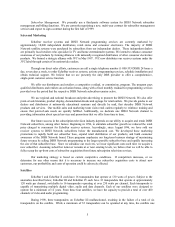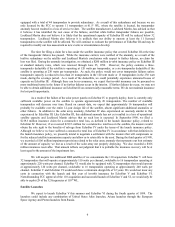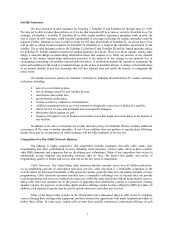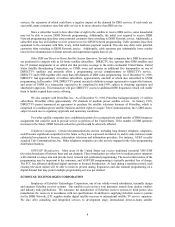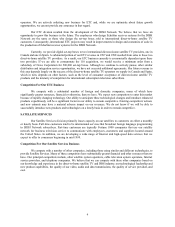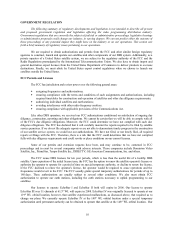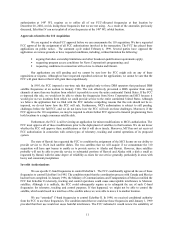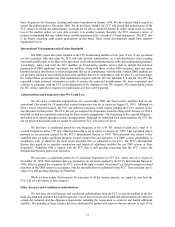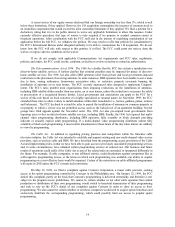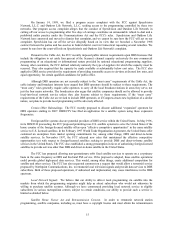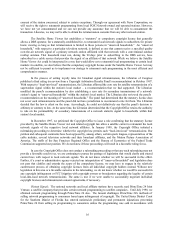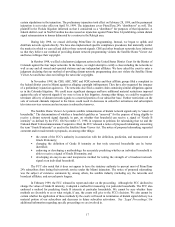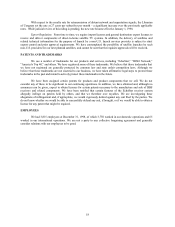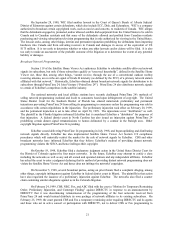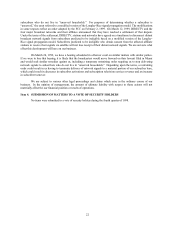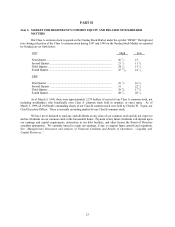Dish Network 1998 Annual Report Download - page 17
Download and view the complete annual report
Please find page 17 of the 1998 Dish Network annual report below. You can navigate through the pages in the report by either clicking on the pages listed below, or by using the keyword search tool below to find specific information within the annual report.15
On January 14, 1999, we filed a program access complaint with the FCC against Speedvision
Network, L.L.C. and Outdoor Life Network, L.L.C. seeking access to the programming controlled by these two
networks. Our program access complaint alleges that the conduct of Speedvision and Outdoor Life Network in
cutting off our access to programming after five days of carriage constitutes an unreasonable refusal to deal and a
prohibited unfair practice under the Communications Act and the FCC’s rules. Speedvision and Outdoor Life
Network have answered and moved to dismiss that complaint, and we cannot be sure how the FCC will act on our
complaint. Speedvision has cut off the service allegedly based on its view that we breached a November 1998
contract between the parties and has sued us in federal district court in Connecticut requesting several remedies. We
cannot be sure how the court will rule on Speedvision’s and Outdoor Life Network’s complaint.
Pursuant to the Cable Act, the FCC recently imposed public interest requirements upon DBS licensees that
include the obligation to set aside four percent of the licensee’s channel capacity exclusively for non -commercial
programming of an educational or informational nature provided by national educational programming suppliers.
Among other constraints, the FCC defined relatively narrowly the type of suppliers for which this capacity must be
reserved. They also required that the capacity be made available at substantially below cost rates. The FCC also
applied to DBS service providers the requirement of providing reasonable access to air-time at favored low rates, and
equal opportunity, for certain qualified candidates for public office.
Although DBS operators are not currently subject to the “must carry” requirements of the Cable Act, the
cable industry and broadcast interests have argued that DBS operators should be subject to these requirements. The
“must carry” rules generally require cable operators to carry all the local broadcast stations in areas they serve, not
just the four major networks. The broadcasters also argue that satellite companies should not be allowed to provide
local-into-local network service unless they also become subject to these requirements. If the “must carry”
requirements of the Cable Act are revised to include DBS operators, or if Congress enacts new legislation of a similar
nature, our plans to provide local programming will be adversely affected.
Certain Other Rulemakings. The FCC recently proposed to allocate additional “expansion” spectrum for
DBS operators starting in 2007. DIRECTV has filed an application for a satellite system using those expansion
frequencies.
Foreign satellite systems also are potential providers of DBS service within the United States. In May 1996,
in its DISCO II proceeding, the FCC proposed permitting non-U.S. satellite systems to serve the United States if the
home country of the foreign-licensed satellite offers open “effective competitive opportunities” in the same satellite
service to U.S. licensed satellites. In the February 1997 World Trade Organization Agreement, the United States offer
contained an exemption from market opening commitments for, among other things, DBS and direct-to-home
satellite services. In November 1997, the FCC released new rules that maintained the effective competitive
opportunities test with respect to foreign-licensed satellites seeking to provide DBS and direct-to-home satellite
services in the United States. The FCC also established a strong presumption in favor of authorizing foreign-licensed
satellites to provide services other than DBS and direct-to-home satellite in the United States.
The FCC has proposed allowing non-geostationary orbit fixed satellite services to operate on a co-primary
basis in the same frequency as DBS and Ku-band FSS service. If the proposal is adopted, these satellite operations
could provide global high-speed data services. This would, among other things, create additional competition for
satellite and other services. The FCC has also requested comment on a request that would allow a terrestrial service
proposed by Northpoint Communications, Inc. to retransmit local television signals and provide data services to DBS
subscribers. Both of these proposed operations, if authorized and implemented, may cause interference in the DBS
spectrum.
Local Network Signals. We believe that our ability to deliver local programming via satellite into the
markets from which the programming originates might help us attract subscribers who would not otherwise be
willing to purchase satellite systems. Although we have commenced providing local network service to eligible
subscribers in various metropolitan centers, subject to certain conditions, our ability to provide such a service is
limited as detailed below.
Satellite Home Viewer Act and Retransmission Consent. In order to retransmit network station
programming, satellite companies, including us, must have a copyright license and must obtain the retransmission


